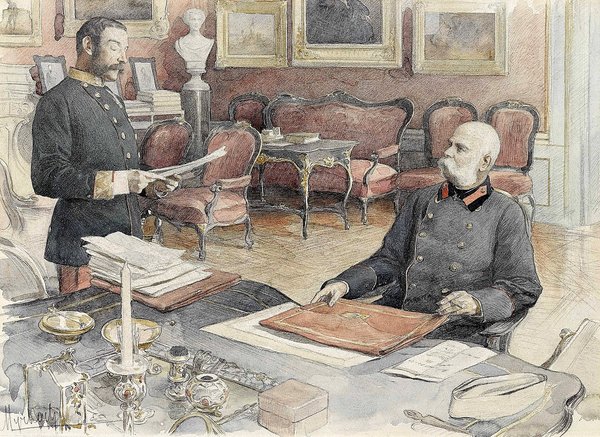
The Emperor’s Desk. A location for political decision-making within the Habsburg Monarchy?" Franz Joseph I and his Imperial Cabinet
Duration: 01/02/2018 to 31/12/2021
Project management: Jana Osterkamp (Collegium Carolinum) and Peter Becker (Universität Wien)
Research project of the Collegium Carolinum in cooperation with the University of Vienna.
German funding for the project is provided by the DFG.
Many contemporary images depict Emperor Franz Joseph as a disciplined toiler at his desk. And such images coincide with his own self-description. But he received the support of his cabinet office to help him do his work. The office carefully registered and logged the approximately 250,000 "Vorträge" (i.e. written notes from ministries, state representatives, private citizens, etc.) that the emperor resolved during the course of his reign. This joint German-Austrian project takes full advantage of the careful bureaucratic indexation of the inputs for the emperor’s "Vorträge". We understand the process as a kind of channel through which the entire effort of government in the Habsburg Monarchy is revealed for the first time through statistical analysis of policy. We note the spread of these "Verträge" over various policy areas and track changes within that spread over time. This effort yields us an overview of the reign and governmental work of Emperor Franz Joseph I.
In addition to this quantitative approach, we will also carry out qualitative studies on our topic. Two doctoral students will be analysing the infrastructure and technology as well as the symbolic politics of the regime using the examples of railway construction and ennoblement practices. These studies concentrate on issues of the distribution of tangible and intangible resources and on the networks maintained by state and non-state actors as an integrative force for the monarchy. A third dissertation deals with the imperial cabinet office itself as a location for political activity. The office was itself, as initially embodied by its director Adolf Braun, strongly networked into a variety of different aspects of the monarchy and society. At the Collegium Carolinum, Marion Dotter’s dissertation project, "Nobilitierungen and Adelsstandserhöhungen des Kaisertums Österreich in der Kabinettskanzlei zur Zeit Kaiser Franz Josephs (1849–1916)" (“Ennoblement and promotion within the nobility by the Austrian monarchy in the cabinet office of Emperor Franz Joseph (1849-1916)”) settles on the topic of symbolic politics, investigating the practice of ennoblement in the Italian provinces of the Habsburg empire.
For the first time, the overall project will offer important insights into the logic of informal politics in the second half of the 19th century using a combination of quantitative and qualitative methods together with text and network analysis.
In addition, a biannual colloquium Staat und "Verwaltung im Gespräch" (“State and administration in conversation”) will be held, hosted alternately between Munich and Vienna.

